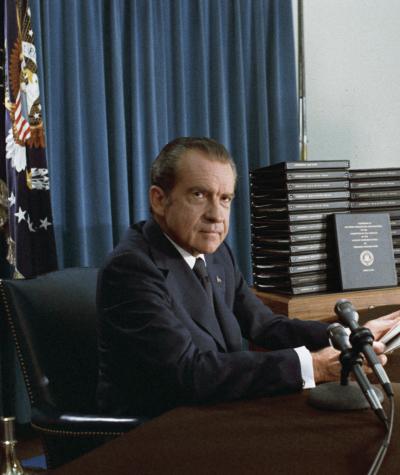President Richard Nixon resigned from office just weeks after releasing Oval Office tape recordings that revealed the extent of his involvement in the Watergate scandal on this month in 1974. Amid that scandal, Nixon famously declared: “People have got to know whether or not their President is a crook. Well, I’m not a crook.”
But how did the people get to learn of Nixon’s wrongdoing? It wasn’t thanks to Nixon, but rather the Supreme Court’s landmark ruling in United States v. Nixon, which required Nixon to release the recordings that precipitated his resignation.
In the spring of 1973, the special prosecutor investigating the Watergate break-in indicted seven Nixon associates and subpoenaed Nixon’s tape recordings of his Oval Office meetings.
But Nixon refused to release the tapes. Instead, he argued that he could ignore the subpoena because the president enjoys an “absolute executive privilege” of immunity from judicial process. In other words, Nixon claimed to be above the law.
But the Supreme Court—which included three Nixon appointees—unanimously rejected Nixon’s argument.
The Court explained that although executive privilege may allow the president to keep certain sensitive information secret in some cases, the president cannot use executive privilege to hide evidence of alleged wrongdoing given “our historic commitment to the rule of law.”
Two weeks later, Nixon released the tapes. Those tapes revealed the extent of Nixon’s involvement in the Watergate cover-up and his reelection campaign’s violations of campaign finance laws.
For example, Nixon’s campaign paid large sums to the Watergate burglars and extorted millions in illegal hidden contributions from corporations.
The discovery of these abuses led to an era of reform, during which Congress strengthened campaign finance laws, created the Federal Election Commission to enforce those laws and passed legislation requiring greater government transparency.
The Nixon ruling remains important today and could play a role in spurring a new round of sorely needed reforms. Similar to Nixon, former President Donald Trump aggressively asserted executive privilege during his term in office.
The Trump administration claimed that executive privilege justified its withholding of potential evidence of wrongdoing relating to, among other things, Special Counsel Robert Mueller’s full report on Russian influence in the 2016 election, Trump’s attempt to fire Mueller and the addition of a citizenship question on the 2020 Census.
Trump also attempted to shield evidence of alleged personal wrongdoing from the light of day. In 2018, the Manhattan District Attorney subpoenaed Trump’s personal accounting firm, seeking the president’s personal and business financial records and tax returns.
The District Attorney’s office was investigating , among other things, whether Trump or his company violated state law by making hush money payments to women alleging affairs with Trump during the 2016 presidential election.
Trump fought the subpoena. Echoing Nixon, Trump claimed that he could ignore the subpoena because a sitting president should enjoy “absolute immunity from state criminal process.” But in an important ruling in July of last year—Trump v. Vance—the Supreme Court unanimously disagreed.
The Court reaffirmed its previous ruling in Nixon and its principle that, “the public has a right to every man’s evidence”—including evidence held by the president, who, unlike a king, “is ‘of the people,’ and subject to the law.”
Trump produced his tax records earlier this year. Last month, Trump’s company was indicted for tax fraud.
Raising further parallels with Watergate, some have argued that Trump’s tax records could also reveal significant campaign finance violations—including violations related to hush money payments by Trump’s lawyer Michael Cohen, which resulted in Cohen’s conviction.
Such revelations would further illustrate how reforms of our ethics laws and campaign finance system are badly needed. Indeed, transparency is essential to hold our elected officeholders to account. As Nixon himself said, the “People have got to know whether or not their President is a crook.”
Thankfully, the Court’s ruling in United States v. Nixon continues to prevent hiding evidence of wrongdoing and reminds us that not even presidents are above the law.

